Do Failed Drug Tests Appear on Background Checks?

Introduction and Overview of Drug Tests in Background Checks
What Is a Background Check?
A background check is a comprehensive review of an individual’s past, conducted to verify their identity, qualifications, and suitability for a role. Employers rely on background checks to assess potential risks associated with hiring a candidate. Common components of a background check include criminal records, education and employment history, credit reports, and drug test results.
In recent years, drug testing has become a significant aspect of pre-employment screening, particularly in industries where safety and productivity are critical. Employers use drug tests to ensure a drug-free workplace, minimize liability, and comply with regulations. But this raises a key question: does a failed drug test show up on a background check?
The Role of Drug Testing in Background Checks
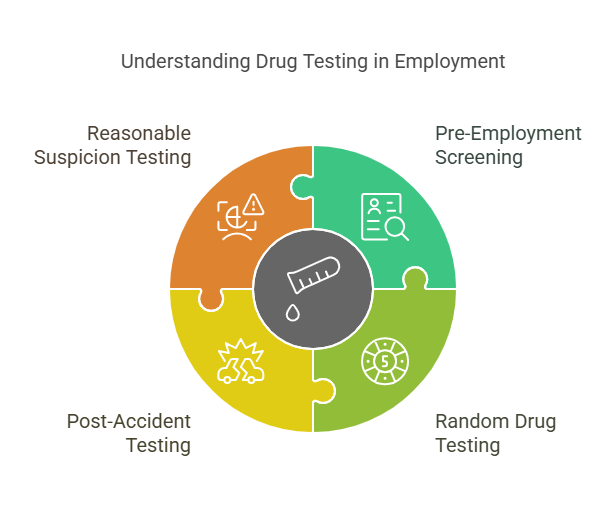
What Is a Drug Test in Employment Screening?
A drug test in employment screening is designed to detect the presence of illegal substances, prescription drugs, or alcohol in a candidate’s system. Employers often use drug testing as part of their background check process to ensure that potential hires can perform their duties safely and responsibly.
When Are Drug Tests Conducted?
Drug tests can be conducted at various stages of employment:
- Pre-Employment Screening: Before extending a formal job offer.
- Random Drug Testing: Periodically testing current employees without prior notice.
- Post-Accident Testing: After a workplace incident to determine if substance use was a contributing factor.
- Reasonable Suspicion Testing: When there’s credible evidence of drug use based on behavior or performance.
Do Failed Drug Tests Show Up on Background Checks?
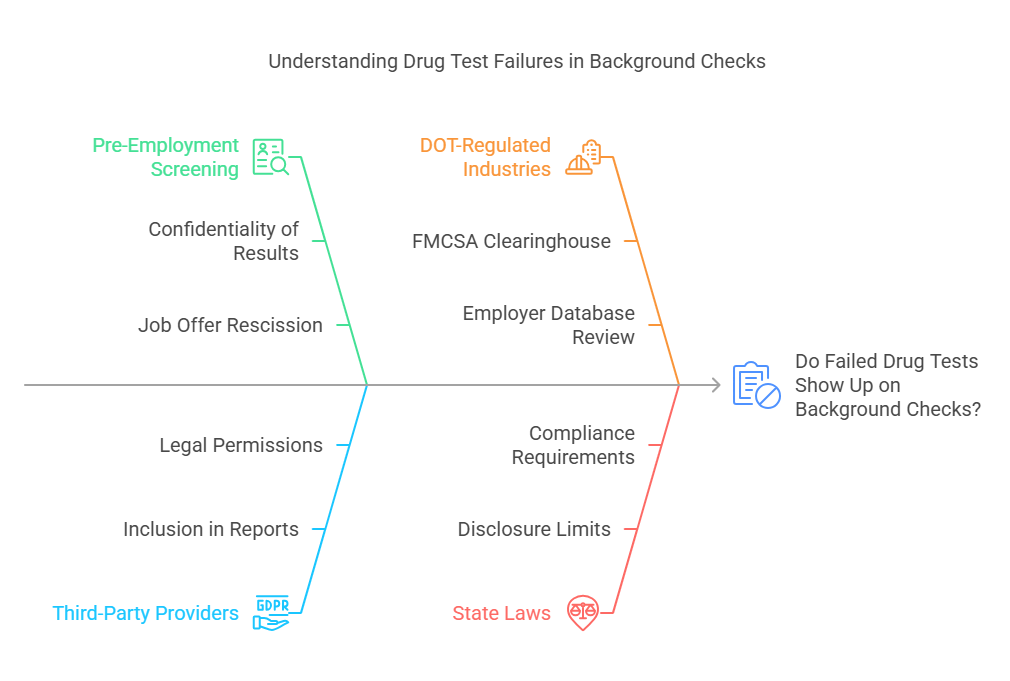
The answer depends on several factors, such as the type of background check conducted, the employer’s policies, and applicable state laws. Let’s explore some scenarios:
- Failed Drug Tests for Pre-Employment Screening:
In most cases, if a candidate fails a pre-employment drug test, the result may not appear on a traditional background check report. Instead, the employer will typically rescind the job offer and keep the results confidential. - Failed Drug Tests Reported to Background Check Agencies:
When drug tests are performed by third-party screening providers, such as Exact Background Checks, the results may be included in a specific drug screening report if permitted by law and requested by the employer. - DOT-Regulated Industries:
For jobs regulated by the Department of Transportation (DOT), such as commercial driving or aviation, failed drug tests are recorded in the Federal Motor Carrier Safety Administration (FMCSA) Drug and Alcohol Clearinghouse. Employers are required to review this database during the hiring process. - Legal Restrictions on Drug Test Reporting:
Some states limit whether failed drug test results can be included in background checks. Employers must ensure compliance with state laws regarding disclosure and confidentiality.
Why Employers Conduct Drug Tests
Employers include drug testing in their hiring process for several reasons:
- Ensuring Workplace Safety: Employees under the influence of drugs or alcohol may pose risks to themselves, their colleagues, and the company.
- Compliance with Regulations: Certain industries, such as healthcare, transportation, and manufacturing, require drug-free policies to comply with federal and state laws.
- Protecting Company Reputation: A drug-free workforce projects professionalism and reliability to clients and stakeholders.
- Reducing Costs: Drug-related accidents and errors can result in significant financial losses, including liability claims and worker’s compensation.
Types of Drug Tests Commonly Used in Background Checks
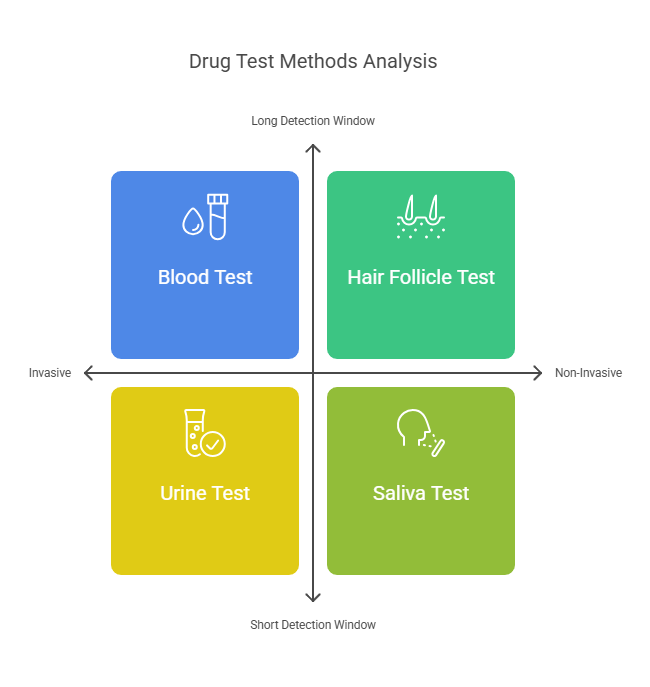
1. Urine Test
The most common type of drug test, a urine test detects substances like marijuana, cocaine, opiates, amphetamines, and PCP. Urine tests are non-invasive, cost-effective, and widely accepted for pre-employment screening.
2. Hair Follicle Test
Hair follicle testing provides a longer detection window, identifying drug use within the past 90 days. This method is often used for high-level positions or in industries where long-term substance use is a concern.
3. Blood Test
Blood tests are highly accurate but more invasive and costly. They are primarily used to detect current intoxication or recent drug use.
4. Saliva Test
Saliva tests are convenient for detecting recent drug use, typically within the past 24–72 hours. They are often used for post-accident or reasonable suspicion testing.
5. Sweat Patch Test
A newer method, sweat patch testing involves wearing a patch that collects sweat over a set period, typically 1–2 weeks. It provides a continuous monitoring option for specific situations.
Factors That Influence Whether Failed Drug Tests Are Reported
Several variables determine whether a failed drug test will show up on a background check:
- Employer Policies: Some companies maintain strict confidentiality about drug test results, while others include them in employee records.
- State and Federal Laws: Laws like the FCRA and local privacy regulations dictate how drug test results can be used and disclosed.
- Industry Standards: Certain industries, such as transportation and healthcare, have stricter requirements for reporting and maintaining drug test records.
- Third-Party Providers: Professional background check companies like Exact Background Checks can customize reports based on employer needs while ensuring compliance with all legal requirements.
How Drug Test Results Are Reported on Background Checks
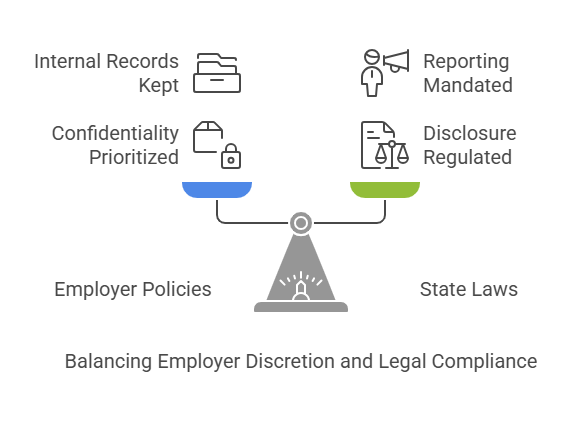
The way drug test results are reported on background checks depends on several factors, including the type of test conducted, employer policies, and compliance with applicable laws. In some cases, the results may not appear at all unless explicitly requested by the employer or required by law. This section dives into the intricacies of drug test reporting, the factors influencing it, and how it impacts employment decisions.
1. Employer Policies and Practices
Employers play a pivotal role in determining how drug test results are handled during the hiring process.
Internal Drug-Free Workplace Policies
Companies with drug-free workplace policies typically require pre-employment drug testing to prevent substance-related risks. If a candidate fails the test, employers may:
- Rescind the job offer.
- Choose to keep the results confidential, meaning they won’t appear on any shared background check reports.
- Record the results internally for future reference.
Confidentiality in Reporting
Most employers prioritize confidentiality when handling drug test results. They often store the information securely and restrict access to authorized personnel. Failed drug test results may not be shared with other employers unless explicitly allowed by the candidate or required by regulatory standards.
Repeat Testing Requirements
Some employers may allow candidates to reapply for the same role after a specific period, requiring a new drug test. These policies vary depending on the organization’s tolerance for previous failed drug tests.
2. State Laws Governing Drug Test Reporting
Drug test reporting is heavily influenced by state-specific laws. Employers must navigate these regulations to ensure compliance while making informed hiring decisions.
States Restricting Drug Test Disclosure
Several states, including California and New York, have strict privacy laws limiting what employers can report in background checks. In these states:
- Failed drug test results cannot appear on general background check reports.
- Employers must obtain explicit consent from candidates to disclose drug test outcomes.
States with Mandatory Reporting for Safety-Sensitive Roles
Certain states mandate drug test reporting for safety-sensitive positions, such as those in transportation or healthcare. For example:
- DOT-Regulated Roles: Employers must review and report drug test results to the Department of Transportation’s Clearinghouse.
- State Licensing Boards: Some professions require reporting failed drug tests as part of licensing or certification processes.
Legalization of Marijuana
The legalization of marijuana in many states has further complicated drug test reporting. For example:
- In states where recreational marijuana use is legal, failed tests for THC may not automatically disqualify candidates unless the position involves safety-sensitive duties.
- Employers must tread carefully to avoid violating discrimination laws, especially in states like Nevada, where laws protect job applicants who test positive for marijuana use outside of work hours.
3. Industry Standards and Federal Regulations
Different industries impose varying levels of scrutiny regarding drug test reporting. Some industries require mandatory drug testing and reporting, while others provide employers with more flexibility.
Industries with Mandatory Drug Testing Requirements
- Transportation and Logistics:
- Federal regulations, such as those enforced by the DOT, mandate drug and alcohol testing for commercial drivers and transportation workers.
- Failed drug tests are reported to the DOT’s Drug and Alcohol Clearinghouse, which employers must review before hiring.
- Healthcare:
- Healthcare professionals are often subject to routine drug testing due to the nature of their work.
- Licensing boards may require failed drug test results to be reported for disciplinary actions.
- Manufacturing and Construction:
- These high-risk industries prioritize workplace safety, requiring pre-employment and random drug testing to prevent accidents.
- Failed tests may result in immediate disqualification or termination.
Industries with Flexible Drug Testing Policies
- Retail and Hospitality:
- Drug testing is less common in these sectors unless required by company policy or local regulations.
- Failed tests are rarely reported externally, focusing instead on internal corrective measures.
- Creative and Technology Sectors:
- These industries often adopt more lenient policies, especially in states where recreational marijuana use is legal.
How Failed Drug Tests Impact Employment
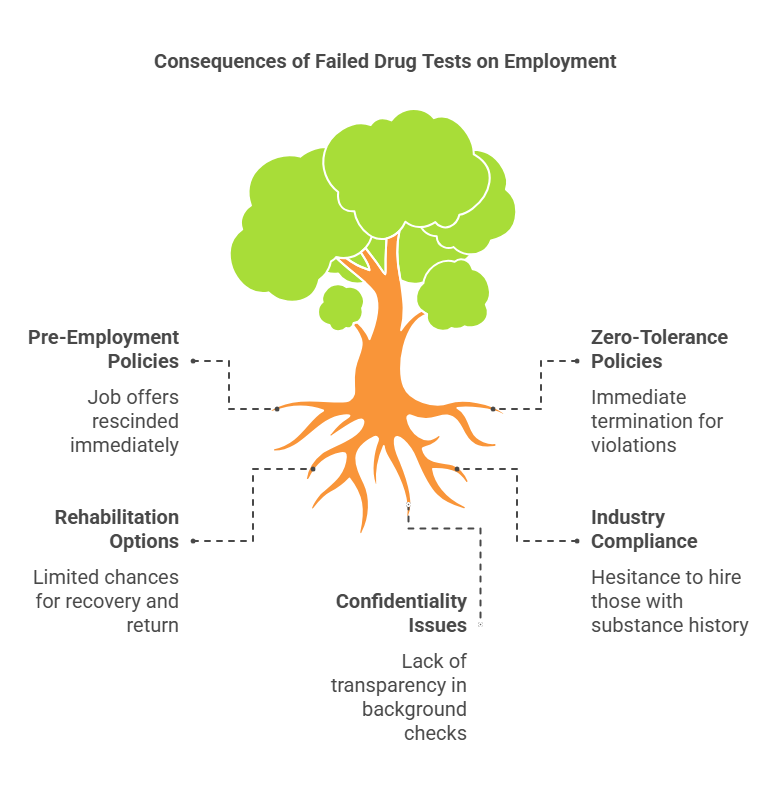
The consequences of failing a drug test vary widely depending on the employer, industry, and the role in question.
1. Pre-Employment Consequences
When a candidate fails a pre-employment drug test, employers typically:
- Rescind the job offer.
- Maintain confidentiality, with results not appearing on general background check reports.
2. Current Employee Consequences
For existing employees, the outcomes of a failed drug test depend on the company’s drug-free workplace policy. Potential actions include:
- Termination: For roles with zero-tolerance policies, termination may be immediate.
- Rehabilitation Programs: Some companies offer employees the opportunity to undergo substance abuse treatment and return to work.
- Suspension: Temporary suspension may occur while the employee addresses the issue.
3. Career Implications
Failed drug tests can have long-term effects on a candidate’s or employee’s career, especially in industries with strict compliance requirements. Employers may hesitate to hire candidates with a history of substance use, particularly for safety-sensitive roles.
How Exact Background Checks Can Help Employers
Exact Background Checks is a trusted provider of employment screening solutions, specializing in accurate and compliant drug testing. Our services are designed to help employers:
- Conduct efficient pre-employment screening with minimal delays.
- Ensure compliance with federal and state laws governing drug testing and background checks.
- Access detailed and reliable drug test results through secure and customizable reports.
Our Comprehensive Services
- Pre-Employment Drug Testing: Identify potential risks before extending job offers.
- Random and Post-Accident Testing: Monitor workplace safety with tailored testing programs.
- Compliance Support: Navigate complex regulations with expert guidance.
- Fast Turnaround Times: Receive timely and accurate results to avoid delays in hiring decisions.
By partnering with Exact Background Checks, employers can reduce hiring risks, ensure compliance, and build a safe, drug-free workplace.
Benefits of Professional Background Screening and Drug Testing
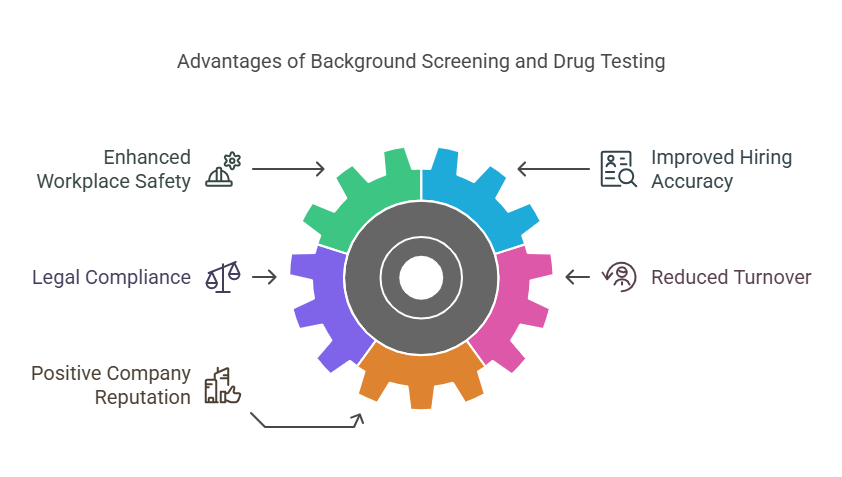
Employers who invest in professional background screening and drug testing services gain several advantages:
1. Enhanced Workplace Safety
Regular drug testing minimizes the risk of workplace accidents caused by substance use, ensuring a safer environment for employees and customers.
2. Improved Hiring Accuracy
Background screening providers like Exact Background Checks deliver accurate and detailed reports, helping employers make informed decisions.
3. Legal Compliance
Compliance with federal, state, and industry-specific regulations protects employers from lawsuits and penalties.
4. Reduced Turnover
Hiring candidates who meet drug-free workplace standards reduces the likelihood of early turnover due to substance use issues.
5. Positive Company Reputation
A commitment to maintaining a drug-free workplace enhances the organization’s reputation, attracting top talent and instilling trust among stakeholders.
Customizing Drug Test Reports Based on Employer Needs
One of the key benefits of working with professional screening providers is the ability to customize reports. Employers can request:
- Drug test results for specific substances based on job requirements.
- Comprehensive or targeted reports depending on the role and industry.
- Confidential reporting that ensures compliance with privacy laws.
Exact Background Checks tailors its services to meet the unique needs of employers, ensuring accuracy, reliability, and compliance at every step.
Legal Aspects of Drug Test Reporting in Background Checks
Employers must carefully navigate legal considerations when conducting drug tests and reporting their results during background checks. Failing to comply with local, state, and federal regulations can expose employers to legal risks, including discrimination claims, privacy violations, and financial penalties. Below, we explore key legal frameworks that govern drug test reporting.
1. Federal Laws Impacting Drug Testing
Fair Credit Reporting Act (FCRA)
The FCRA regulates how background checks, including drug test results, are conducted and shared. Employers must:
- Obtain written consent from candidates before conducting a background check that includes drug testing.
- Provide a pre-adverse action notice if they plan to take negative action (e.g., rescinding a job offer) based on drug test results.
- Share a copy of the drug test report and a summary of FCRA rights with the candidate.
Americans with Disabilities Act (ADA)
The ADA prohibits discrimination against individuals with disabilities, including those recovering from substance abuse. Employers cannot:
- Deny employment solely based on past addiction or participation in rehabilitation programs.
- Require drug testing for prescription medications unless necessary for the role.
Department of Transportation (DOT) Regulations
For DOT-regulated industries, drug and alcohol testing is mandatory. Employers must report failed tests to the Drug and Alcohol Clearinghouse and ensure compliance with strict recordkeeping and reporting requirements.
2. State-Specific Laws on Drug Test Reporting
State laws vary widely regarding the disclosure and use of drug test results in background checks.
States With Restrictive Drug Test Reporting Laws
- California and New York: Restrict the inclusion of drug test results in general background check reports.
- Nevada: Prohibits rejecting job applicants based solely on marijuana test results for non-safety-sensitive roles.
Marijuana Legalization and Testing
As more states legalize recreational and medical marijuana, employers must adapt their drug testing policies to remain compliant. For example:
- In Illinois, employers can still test for marijuana but must demonstrate impairment or job performance issues if taking adverse action.
- Colorado allows employers to maintain drug-free workplace policies even though marijuana is legal statewide.
3. Privacy and Confidentiality Considerations
Employers must respect candidates’ and employees’ privacy when handling drug test results. Key considerations include:
- Secure Storage: Drug test results should be stored separately from general personnel files and accessed only by authorized personnel.
- Limited Disclosure: Results should only be shared with necessary parties and kept confidential to avoid privacy breaches.
FAQs About Drug Tests and Background Checks
Here are some frequently asked questions about drug testing and background checks, with detailed answers to provide clarity:
Do Failed Drug Tests Appear on Background Checks?
No, it depends on factors like employer policies, state laws, and industry regulations. In most cases, pre-employment failed drug tests are kept confidential by the employer.
What are the common types of drug tests used in background checks?
Common types include urine tests, hair follicle tests, blood tests, saliva tests, and sweat patch tests, each with different detection windows and uses.
Why do employers conduct drug tests as part of background checks?
Employers conduct drug tests to ensure workplace safety, comply with regulations, protect company reputation, and reduce costs associated with drug-related incidents.
How are drug test results reported on background checks?
Reporting varies by employer policy, state laws, and industry standards. Results might be kept internal, reported to specific agencies (like the DOT Clearinghouse), or not reported at all unless legally required.
What are the key legal considerations for employers when conducting drug tests in background checks?
Employers must comply with federal laws like the FCRA and ADA, adhere to state-specific laws regarding disclosure and privacy, and follow industry regulations, especially in safety-sensitive sectors.
Do Failed Drug Tests Appear on Background Checks?
No, it depends on factors like employer policies, state laws, and industry regulations. In most cases, pre-employment failed drug tests are kept confidential by the employer.
What are the common types of drug tests used in background checks?
Common types include urine tests, hair follicle tests, blood tests, saliva tests, and sweat patch tests, each with different detection windows and uses.
Why do employers conduct drug tests as part of background checks?
Employers conduct drug tests to ensure workplace safety, comply with regulations, protect company reputation, and reduce costs associated with drug-related incidents.
How are drug test results reported on background checks?
Reporting varies by employer policy, state laws, and industry standards. Results might be kept internal, reported to specific agencies (like the DOT Clearinghouse), or not reported at all unless legally required.
What are the key legal considerations for employers when conducting drug tests in background checks?
Employers must comply with federal laws like the FCRA and ADA, adhere to state-specific laws regarding disclosure and privacy, and follow industry regulations, especially in safety-sensitive sectors.
Conclusion
Drug testing is a critical component of background checks, ensuring workplace safety, compliance, and productivity. While failed drug tests may or may not show up on background checks depending on the circumstances, employers must navigate the legal and ethical considerations surrounding their use and reporting.
Exact Background Checks plays an essential role in helping employers manage their screening processes. By offering reliable, accurate, and compliant drug testing services, we empower businesses to make informed hiring decisions while respecting candidate privacy and adhering to legal standards.
Key Takeaways:
- Whether a failed drug test appears on a background check depends on factors like employer policies, industry regulations, and state laws.
- Employers must comply with legal frameworks like the FCRA, ADA, and state-specific laws to avoid liability.
- Drug testing policies should balance workplace safety with respect for employee privacy and rights.
- Professional background screening providers, like Exact Background Checks, simplify the process by ensuring compliance and delivering accurate results.
By adopting proper screening practices, businesses can foster a safe and productive work environment while minimizing legal risks. To learn more about how Exact Background Checks can assist your organization, contact us today for tailored solutions.



